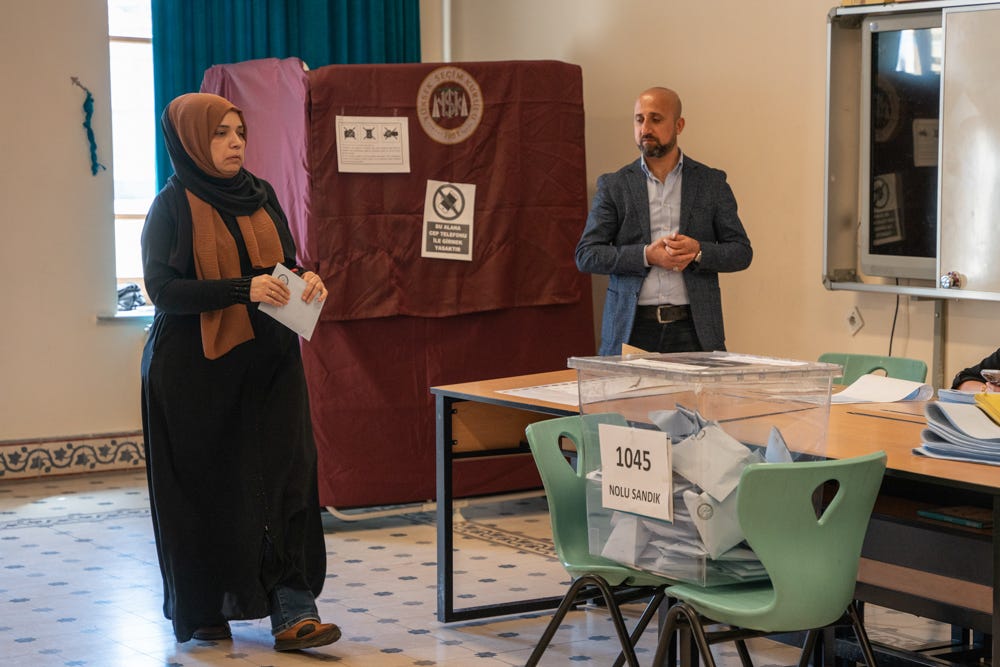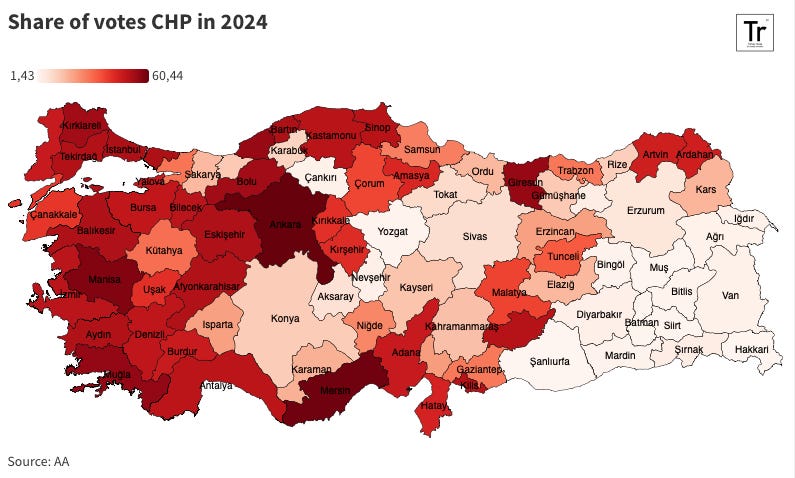İSTANBUL – On Sunday evening, as the election results became clear, 24-year old student Dilan went to Saraçhane in İstanbul to celebrate the victory of incumbent İstanbul mayor Ekrem İmamoğlu.
With a flag of the re-elected Republican People’s Party (CHP) politician draped around her shoulders, she danced with fellow opposition supporters.
“The election last year was a huge disappointment, that is why we are even happier now,” she told Turkey recap, adding there was a bittersweet side to the win.
“In my opinion, if İmamoğlu had been the candidate in last year's election, we would have won 100 percent,” Dilan said.
She blamed last year’s opposition alliance, known as the Table of Six, for losing the elections. “It cost us five years,” Dilan said.
The CHP won by wide margins in İstanbul, Ankara and other races across the country, reigniting discussions about their failed election strategy in 2023, the role of candidates and the road ahead for the country’s opposition.
Importance of the candidate
“After the 2024 local elections, the opposition's mixed feelings towards the outcome stem from the realization that the nomination of İmamoğlu could have potentially secured a victory much earlier,” said Şebnem Yardımcı Geyikçi, a research associate at the University of Bonn.
The results seem to indicate it is in fact possible to beat the Justice and Development Party (AKP) and President Recep Tayyip Erdoğan, something the opposition coalition was unable to do with former CHP head, Kemal Kılıçdaroğlu, as a presidential candidate in 2023.
Yardımcı Geyikçi underlined that during Kılıçdaroğlu’s 13-year term as head of the CHP, the party seized control of several major cities in 2019, demonstrated its governance capabilities and called for a unified effort in reversing the nation’s “one-man regime” to more democratic rule.
“However, as I also noted then, the effectiveness of this message hinged on the choice of the right candidate,” Yardımcı Geyikçi told Turkey recap. “In a presidential system that prioritizes the individual over the program, the selection of the opposition's candidate was crucial.”
On a similar line, Edgar Şar, political scientist and director at İstanPol research institute, believes İmamoğlu would’ve been able to attract many more votes than Kılıçdaroğlu if he had been the presidential candidate last year, although he is not sure it would have been sufficient to win against Erdoğan.
“Kılıçdaroğlu’s candidacy was a mistake, seeing the results and also how he handled the post-electoral process in general,” Şar told Turkey recap. “But I think the opposition’s loss goes well beyond candidate selection. It was one of the factors, but what is much more important in explaining the loss is how the Table of Six handled the entire campaign.”
Alliance mistakes
During last year’s elections, Kılıçdaroğlu’s candidacy was highly contested as many doubts overshadowed his capability to win, fostering disputes within the Table of Six.
This alliance consisted of CHP, İYİ Party, Democrat Party, Saadet, DEVA and Gelecek Party, and fell apart soon after the election.
Except for the CHP, the parties performed poorly in the March 31 election. İYİ received 3.77 percent of the vote, Saadet a little over 1 percent, DEVA 0.33 percent, Democrat Party 0.20 percent and Gelecek only 0.07 percent – just 34,212 votes nationwide.
Derin Koçer, a policy and communications consultant, said the desire for change in Turkey – as expressed during this election – was not new. Though he added there was a lack of a convincing alternative prior to this election.
“In 2023, the ‘Table of Six’ was an alliance among the political elites, none of which had a meaningful electoral victory in the past. They were more interested in doing politics as a give-and-take among each other, rather than seeking to represent the will of the people,” Koçer told Turkey recap.
“This time, CHP did the exact opposite and talked to the people directly. We saw that people’s willingness to ignite change was stronger than their party affiliations,” he added.
Change in CHP
Following last year’s disappointment, a ‘movement for change’ started in the party, with İmamoğlu as one its the loudest proponents.
Kılıçdaroğlu resigned from party leadership when the CHP chose Özgür Özel as its new chair during a party congress in November 2023.
“The fact that the CHP managed to change leadership seems to have successfully created the impression among the electorate that the party learned a lesson from the general election defeat, which is not the case for any other opposition party,” Şar said.
But Şar also pointed out the CHP did not choose to run alone in these elections. It negotiated with other parties, but all of them decided to field their own candidates, who then campaigned against the CHP.
Instead of engaging in attacks from most notably İYİ, the CHP focused on its fight with the government, which Şar believed was crucial to receive votes from people aligned with other parties as well. The CHP swept the polls despite pre-election concerns over the dissolved alliance potentially splintering votes and giving the upper hand to the ruling party.
On March 31, the main opposition party came out as the top party in terms of total votes, with a 37.77 percent share. The party will govern 35 of Turkey’s 81 provinces as well as 337 districts.
CHP also took over some municipalities considered to be AKP strongholds like Adıyaman, Afyonkarahisar, Balıkesir, Denizli and Kırıkkale – all provinces where the party did not even run a candidate in 2019, and instead supported İYİ Party candidates.
According to Nora Fisher Onar, Assoc. Prof. of International Studies at San Francisco University told Turkey recap, this shows the CHP can reach out to the voters of other parties without an alliance on the institutional level.
“CHP swifted traditionally AKP provinces,” Fisher Onar told Turkey recap, adding the wins pushed back against claims that the AKP was the only authentic choice for Anatolia.
She added, “The [ruling] People’s Alliance also lost a lot of ground. [Also], the İYİ Party pretty much imploded in this election. This shows a pushback against the 2023 victory of the Turkish-Islamist synthesis 2.0.”
In Erdoğan’s biggest electoral setback to date, the AKP vote share declined to 35.49 percent, accounting for a 9 percent decrease compared with the previous local elections.
The AKP will still run more district municipalities than the CHP, though it will govern a smaller number of citizens on the local level as the CHP took much of Turkey’s largest population centers.
Low turnout
Sunday’s voter turnout was lower than in recent elections, totalling 78.1 percent – it was 85 percent in 2019 local elections and 84 percent in the second round of last year’s presidential elections.
It is possible to say the CHP won because it received the most votes in the elections. The counter-argument is the AKP lost, mostly because initial assessments seem to indicate many of their voters abstained.
According to preliminary results, CHP increased its total vote share in 61 provinces, while the AKP increased its vote share in 16 provinces. The latter lost 17 municipalities it had won in 2019, and currently holds 24 municipalities.
Ten provinces previously held by the AKP were taken by CHP, two by MHP and YRP each while BBP, İYİ Party and DEM got one.
“AKP supporters deciding not to go out to vote significantly, created this result,” Şar said.
“When the turnout is low there has been a common sense among Turkey’s analysts that those who abstain from voting were generally from opposition voters,” he continued. “But research we did at İstanPol showed that a similar apathetic tendency was also observed among AKP voters.”
Analysts believe the economy was a main factor in the outcome as voters flashed a warning sign for the president. Local election campaigns focused on providing services, instead of existential topics like national security. Similarly, in the last election there was already a gap between AKP votes in the parliamentary election and Erdoğan votes on the presidential ballot.
While some AKP voters abstained this year, others opted to vote for Yeniden Refah Party (YRP) instead.
“The YRP was within the ruling alliance in the general election last year so this created a kind of trust among AKP voters towards the party, because they did not betray Erdoğan when his presidency was at stake, “ Şar said.
Reflecting further on the results, Yardımcı Geyikçi thought it would be “unfair” to interpret the results as an AKP loss rather than CHP win.
“The CHP was able to find the right candidates in the local elections, persuading the electorate of its governance potential, positioning itself as a credible alternative [to the AKP],” she said.
What next for CHP?
In this election, CHP also gained leverage by securing a majority in municipal councils. Since 2019, it has faced challenges in allocating funds and getting approval for implementing projects because AKP-MHP coalitions often blocked opposition plans and initiatives.
Fisher Onar said CHP now will have amplified resources and legitimacy to develop its projects and procedures.
“For CHP, the past five years have been about trying to take over a number of operations they were legally mandated to run … Now the ball is in the CHP’s court to build and deliver new services.”
The main challenge will be retaining voters that supported CHP in this round even though they were not traditional CHP voters. One approach might involve municipal economic and welfare support programs, Şar said, as the CHP has the opportunity to show how it manages and governs to new constituents.
“They should clearly indicate what CHP municipalism looks like and the differences that it makes from the AKP municipalism,” Şar told Turkey recap.
All commentators stressed the importance of depolarization, which was also highlighted by researcher Feyza Akınerdem when she shared a social media post on Üsküdar’s flip from AKP to CHP.
“The neighborhoods from Üsküdar to Çamlıca Hill consist of upper-middle class people with similar lifestyles … Political division does not determine social life. These people, tired of polarization, constantly expressed in our fieldwork that divisive language should end,” Akınerdem wrote.
Most commentators interviewed by Turkey recap pointed to İmamoğlu and re-elected Ankara mayor Mansur Yavaş, who were able to gain support beyond the traditional base of their party.
CHP head Özel also reached across the aisle in his speech on election night.
“I want you to know that there is no loser in this victory,” Özel said. “Our success will not be anyone's defeat, it is not anyone's defeat. No matter which party they voted for today, we do not want anyone to feel like they lost.”
Similarly, in his speech, İmamoğlu mentioned Kurds and other minorities in İstanbul, as a considerable number of DEM party voters supported him instead. He said there would be no discrimination in service distribution.
“The polarization that has divided us for years will give way to unity,” İmamoğlu said. “The divisive rhetoric that once viewed political opponents as enemies will fade into obscurity.”
Moving forward, Koçer also argued it will be crucial for the opposition party to appeal to voters who abstained in this election.
“The low turnout implies that Turkey has a new political demographic now: The ‘Persuadables’ – voters who stayed home [Sunday] and will be watching what CHP does in power,” Koçer said. “It’s CHP’s country to lose now.”
This newsletter is supported by readers via Substack and Patreon. Paid subscribers get full access to our recaps, reports, members-only Slack and more. We also have pun-tastic merch. All proceeds go towards sustaining our journalism.
Turkey recap is an independent news platform produced by the Kolektif Medya Derneği, an İstanbul-based non-profit association founded by our editorial team to support and elevate news media and journalists in Turkey.
Send pitches, queries and feedback to: info@turkeyrecap.com
Diego Cupolo, Editor-in-chief @diegocupolo
Gonca Tokyol, Editor-at-large @goncatokyol
Ingrid Woudwijk, Managing editor @deingrid
Verda Uyar, Digital growth manager @verdauyar
Sema Beşevli, Editorial intern @ssemab_
Onur Hasip, Editorial intern @onurhasip







